高考英语新情态动词知识点全集汇编(3)
- 格式:doc
- 大小:59.00 KB
- 文档页数:9
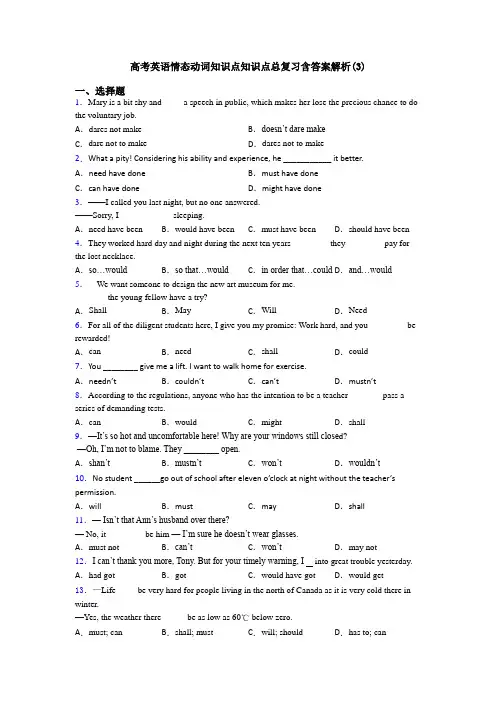
高考英语情态动词知识点知识点总复习含答案解析(3)一、选择题1.Mary is a bit shy and ____ a speech in public, which makes her lose the precious chance to do the voluntary job.A.dares not make B.doesn’t dare makeC.dare not to make D.dares not to make2.What a pity! Considering his ability and experience, he ___________ it better.A.need have done B.must have doneC.can have done D.might have done3.——I called you last night, but no one answered.——Sorry, I____________ sleeping.A.need have been B.would have been C.must have been D.should have been 4.They worked hard day and night during the next ten years ________ they ________ pay for the lost necklace.A.so…would B.so that…would C.in order that…could D.and…would5.---We want someone to design the new art museum for me.---_____ the young fellow have a try?A.Shall B.May C.Will D.Need6.For all of the diligent students here, I give you my promise: Work hard, and you ________ be rewarded!A.can B.need C.shall D.could7.You ________ give me a lift. I want to walk home for exercise.A.n eedn’t B.couldn’t C.can’t D.mustn’t 8.According to the regulations, anyone who has the intention to be a teacher _______ pass a series of demanding tests.A.can B.would C.might D.shall9.—It’s so hot and uncomfortable here! Why are your windows still close d?—Oh, I’m not to blame. They ________ open.A.shan’t B.mustn’t C.won’t D.wouldn’t10.No student ______go out of school after eleven o’clock at night without the teacher’s permission.A.will B.must C.may D.shall 11.—Isn’t that Ann’s husband over there?— No, it ________ be him —I’m sure he doesn’t wear glasses.A.must not B.can’t C.won’t D.may not12.I can’t thank you more, Tony. But for your timely warning, I into great trouble yesterday. A.had got B.got C.would have got D.would get 13.—Life ____ be very hard for people living in the north of Canada as it is very cold there in winter.—Yes, the weather there _____ be as low as 60℃ below zero.A.must; can B.shall; must C.will; should D.has to; can14.As you worked late last night, you __________ have come this morning.A.may not B.can’t C.mustn’t D.needn’t15.You ______ have been out last night, for all the lights in your room were not on.A.need B.must C.may D.should16.He didn’t follow the doctor’s suggestions as required, but he _________.A.ought B.ought to C.ought to be D.ought to have 17.Louis Cha (金庸) passed away. As for his achievement, there is such a comment, “He ______ the Nobel Prize for Literature with his written works translated into English.”A.could have been rewarded B.must have been rewardedC.should be rewarded D.need have been rewarded18.AI will surely be a feature of future life, but it _____ be used responsibly and in a proper way. A.can B.need C.must D.will19.The lady ________ have done something wrong, because she is looking guilty.A.would B.should C.can D.must20.You _________ me about it earlier, but you didn't.A.should have told B.would have toldC.must have told D.should tell21.Tom told us that he ______ come to the party tonight, but he wasn’t sure about this.A.will B.would C.could D.might22.— Did Bob take the job in the supermarket? — No, but I think he _________.A.will have B.may have C.should have D.must have 23.—Jane, why don’t you take a bite of the chocolate?—Well, I am on diet, if you __________know.A.must B.shall C.would D.could24.I _________ my driving test but I didn’t operate carefully.A.should pass B.may passC.might have passed D.might pass25.Hurry up! Tom _______ for us at the gate.A.must wait B.must be waitingC.can be waiting D.must have waited【参考答案】***试卷处理标记,请不要删除一、选择题1.B解析:B【解析】【详解】考查动词。

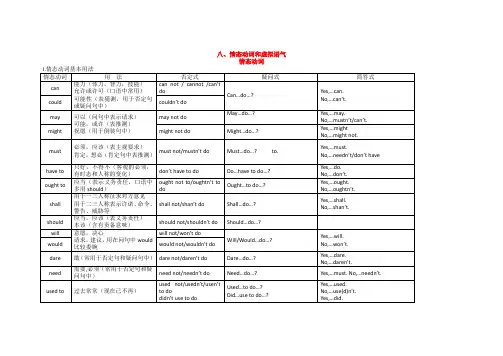
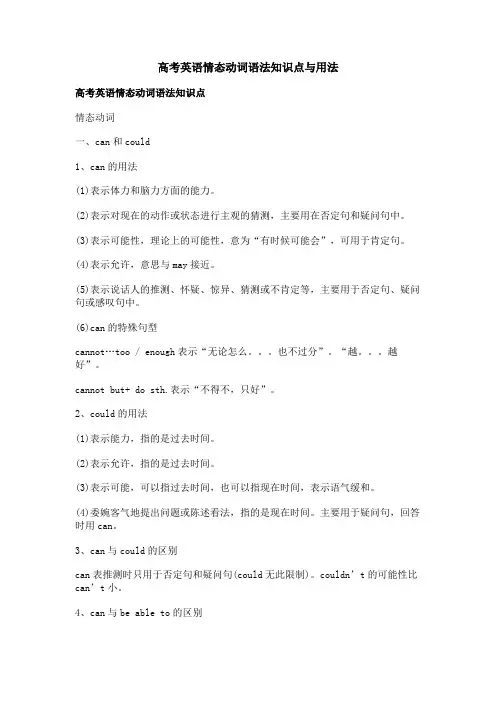
高考英语情态动词语法知识点与用法高考英语情态动词语法知识点情态动词一、can和could1、can的用法(1)表示体力和脑力方面的能力。
(2)表示对现在的动作或状态进行主观的猜测,主要用在否定句和疑问句中。
(3)表示可能性,理论上的可能性,意为“有时候可能会”,可用于肯定句。
(4)表示允许,意思与may接近。
(5)表示说话人的推测、怀疑、惊异、猜测或不肯定等,主要用于否定句、疑问句或感叹句中。
(6)can的特殊句型cannot…too / enough表示“无论怎么。
也不过分”。
“越。
越好”。
cannot but+ do sth.表示“不得不,只好”。
2、could的用法(1)表示能力,指的是过去时间。
(2)表示允许,指的是过去时间。
(3)表示可能,可以指过去时间,也可以指现在时间,表示语气缓和。
(4)委婉客气地提出问题或陈述看法,指的是现在时间。
主要用于疑问句,回答时用can。
3、can与could的区别can表推测时只用于否定句和疑问句(could无此限制)。
couldn’t的可能性比can’t小。
4、can与be able to的区别(1)现在时:无区别,但后者不常用。
(2)完成时;can没有完成时,此时要用have(has,had)been able to。
(3)将来时:can没有将来时,要用will be able to。
(4)过去时:could表示一般能力,was/were able to 表示在具体场合通过努力成功做成某事的能力。
二、may 和might1、may的用法(1)表示询问或说明一件事可不可以做。
(2)表示一件事或许会发生或某种情况可能会存在,通常用在肯定句和否定句中。
注意:表示可能性时,can’t语气强,表示“不可能”,may not语气弱,表示“可能不”。
2、might的用法(1)表示询问或允许,指的是过去时间。
(2)表示可能发生的事,可以指过去时间,也可以指现在时间,语气更加不肯定,可能性比may小一些。
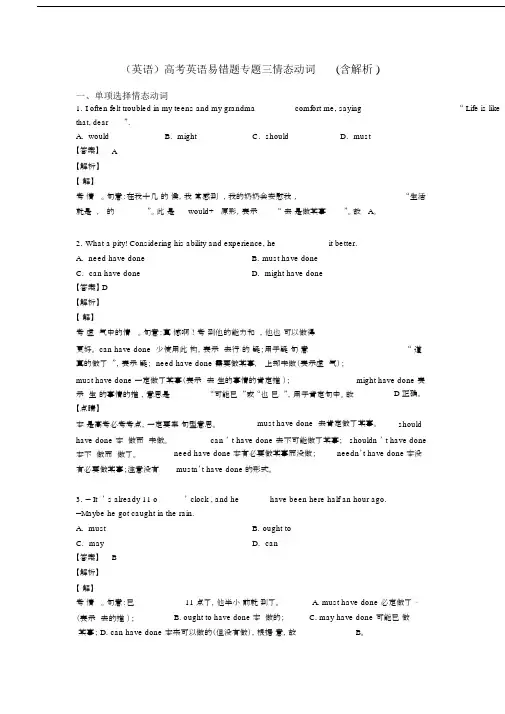
(英语)高考英语易错题专题三情态动词(含解析 )一、单项选择情态动词1.I often felt troubled in my teens and my grandma ________ comfort me, saying“ Life is like that, dear”.A. would B. might C. should D. must【答案】A【解析】【解】考情。
句意:在我十几的候,我常感到,我的奶奶会安慰我,“生活就是,的”。
此是would+ 原形,表示“ 去是做某事”。
故A。
2.What a pity! Considering his ability and experience, he ___________ it better.A. need have done B.must have doneC. can have done D. might have done【答案】 D【解析】【解】考虚气中的情。
句意:真憾啊!考到他的能力和,他也可以做得更好。
can have done 少使用此构,表示去行的疑;用于疑句意“ 道真的做了”,表示疑; need have done 需要做某事,上却未做(表示虚气);must have done 一定做了某事(表示去生的事情的肯定推);might have done 表示生的事情的推,意思是“可能已”或“也已”,用于肯定句中。
故 D 正确。
【点睛】本是高考必考考点,一定要牢句型意思。
must have done 去肯定做了某事。
shouldhave done 本做而未做。
can ’ t have done去不可能做了某事; shouldn ’ t have done本不做而做了。
need have done 本有必要做某事而没做;needn’t have done本没有必要做某事;注意没有mustn’t have done的形式。
3.— It ’ s already 11 o’ clock , and he ______ have been here half an hour ago.—Maybe he got caught in the rain.A. must C. may B.ought to D. can【答案】B 【解析】【解】考情。
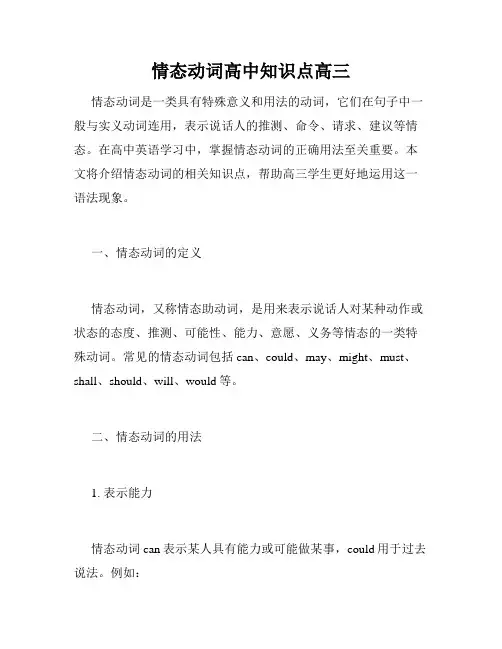
情态动词高中知识点高三情态动词是一类具有特殊意义和用法的动词,它们在句子中一般与实义动词连用,表示说话人的推测、命令、请求、建议等情态。
在高中英语学习中,掌握情态动词的正确用法至关重要。
本文将介绍情态动词的相关知识点,帮助高三学生更好地运用这一语法现象。
一、情态动词的定义情态动词,又称情态助动词,是用来表示说话人对某种动作或状态的态度、推测、可能性、能力、意愿、义务等情态的一类特殊动词。
常见的情态动词包括can、could、may、might、must、shall、should、will、would等。
二、情态动词的用法1. 表示能力情态动词can表示某人具有能力或可能做某事,could用于过去说法。
例如:- She can speak three languages fluently.(她能说流利的三种语言)- He could lift the heavy boxes when he was younger.(他年轻时能搬起这些沉重的箱子)2. 表示推测和可能性情态动词may、might、could用于表示推测和可能性。
may用于表示较为肯定的推测,might和could表示推测的可能性较小。
例如:- The weather is cloudy, it may rain later.(天气多云,可能会下雨)- He might be late for the meeting.(他可能会迟到会议)3. 表示义务和建议情态动词must表示说话人对某种行为具有强烈的责任感或坚决要求,should表示建议。
例如:- We must obey the laws of the country.(我们必须遵守国家的法律)- You should apologize to your friend for your mistake.(你应该为你的错误向朋友道歉)4. 表示许可和请求情态动词can、may、could用于表示允许和请求。
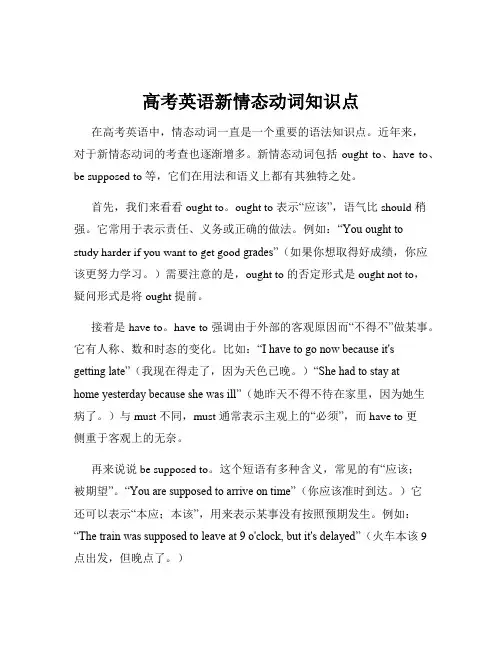
高考英语新情态动词知识点在高考英语中,情态动词一直是一个重要的语法知识点。
近年来,对于新情态动词的考查也逐渐增多。
新情态动词包括 ought to、have to、be supposed to 等,它们在用法和语义上都有其独特之处。
首先,我们来看看 ought to。
ought to 表示“应该”,语气比 should 稍强。
它常用于表示责任、义务或正确的做法。
例如:“You ought to study harder if you want to get good grades”(如果你想取得好成绩,你应该更努力学习。
)需要注意的是,ought to 的否定形式是 ought not to,疑问形式是将 ought 提前。
接着是 have to。
have to 强调由于外部的客观原因而“不得不”做某事。
它有人称、数和时态的变化。
比如:“I have to go now because it's getting late”(我现在得走了,因为天色已晚。
)“She had to stay athome yesterday because she was ill”(她昨天不得不待在家里,因为她生病了。
)与 must 不同,must 通常表示主观上的“必须”,而 have to 更侧重于客观上的无奈。
再来说说 be supposed to。
这个短语有多种含义,常见的有“应该;被期望”。
“You are supposed to arrive on time”(你应该准时到达。
)它还可以表示“本应;本该”,用来表示某事没有按照预期发生。
例如:“The train was supposed to leave at 9 o'clock, but it's delayed”(火车本该 9 点出发,但晚点了。
)在具体的语境中,这些新情态动词的运用需要我们仔细分辨。
比如,在表达建议时,ought to 可能更合适;在强调客观条件限制时,have to 更为准确;而 be supposed to 则在描述期望和规定方面用得较多。
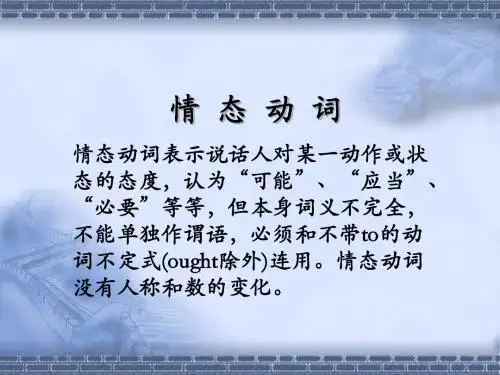
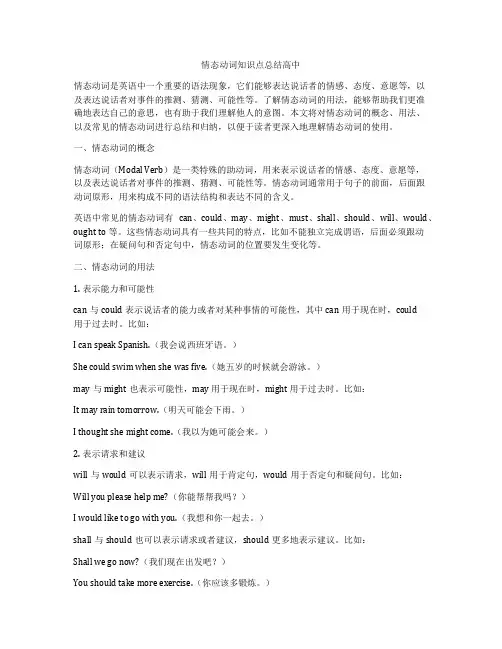
情态动词知识点总结高中情态动词是英语中一个重要的语法现象,它们能够表达说话者的情感、态度、意愿等,以及表达说话者对事件的推测、猜测、可能性等。
了解情态动词的用法,能够帮助我们更准确地表达自己的意思,也有助于我们理解他人的意图。
本文将对情态动词的概念、用法、以及常见的情态动词进行总结和归纳,以便于读者更深入地理解情态动词的使用。
一、情态动词的概念情态动词(Modal Verb)是一类特殊的助动词,用来表示说话者的情感、态度、意愿等,以及表达说话者对事件的推测、猜测、可能性等。
情态动词通常用于句子的前面,后面跟动词原形,用来构成不同的语法结构和表达不同的含义。
英语中常见的情态动词有can、could、may、might、must、shall、should、will、would、ought to等。
这些情态动词具有一些共同的特点,比如不能独立完成谓语,后面必须跟动词原形;在疑问句和否定句中,情态动词的位置要发生变化等。
二、情态动词的用法1. 表示能力和可能性can与could表示说话者的能力或者对某种事情的可能性,其中can用于现在时,could用于过去时。
比如:I can speak Spanish.(我会说西班牙语。
)She could swim when she was five.(她五岁的时候就会游泳。
)may与might也表示可能性,may 用于现在时,might 用于过去时。
比如:It may rain tomorrow.(明天可能会下雨。
)I thought she might come.(我以为她可能会来。
)2. 表示请求和建议will与would可以表示请求,will用于肯定句,would用于否定句和疑问句。
比如:Will you please help me?(你能帮帮我吗?)I would like to go with you.(我想和你一起去。
)shall与should也可以表示请求或者建议,should更多地表示建议。
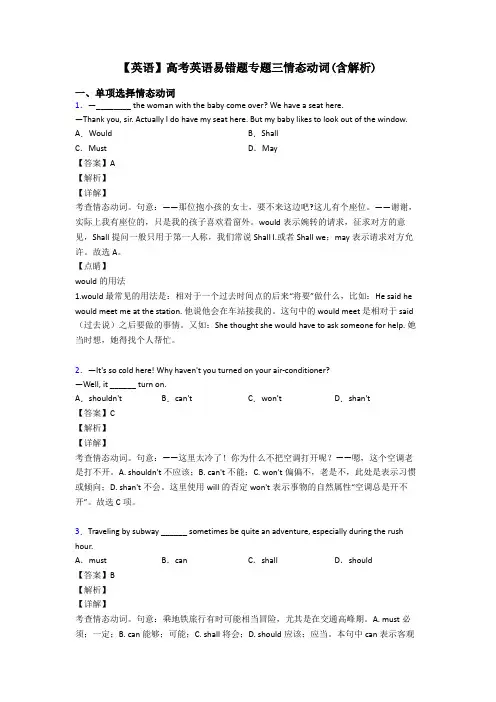
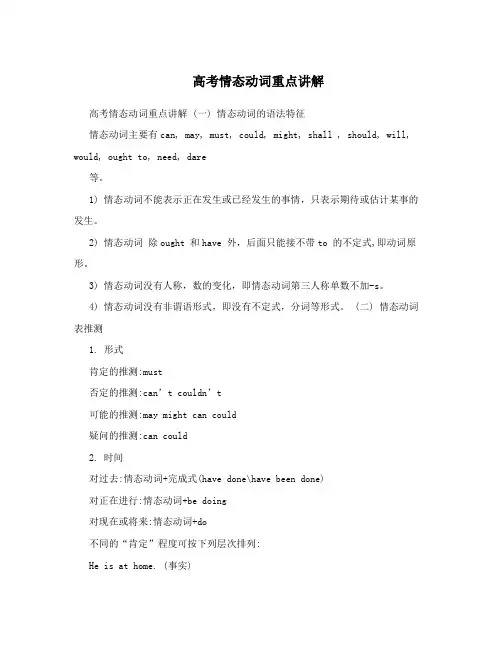
高考情态动词重点讲解高考情态动词重点讲解 (一) 情态动词的语法特征情态动词主要有can, may, must, could, might, shall , should, will, would, ought to, need, dare等。
1) 情态动词不能表示正在发生或已经发生的事情,只表示期待或估计某事的发生。
2) 情态动词除ought 和have 外,后面只能接不带to 的不定式,即动词原形。
3) 情态动词没有人称,数的变化,即情态动词第三人称单数不加-s。
4) 情态动词没有非谓语形式,即没有不定式,分词等形式。
(二) 情态动词表推测1. 形式肯定的推测:must否定的推测:can’t couldn’t可能的推测:may might can could疑问的推测:can could2. 时间对过去:情态动词+完成式(have done\have been done)对正在进行:情态动词+be doing对现在或将来:情态动词+do不同的“肯定”程度可按下列层次排列:He is at home. (事实)He must be at home.(非常肯定的推断)He could be at home.(很可能)He ought to be at home.(很可能)He may be at home.(仅仅可能而已)He might be at home.(或许, 非常不确定)He might not be at home.(也许不在家)He may not be at home. (比might可能)He couldn’t be at home.(很可能不在家)He can’t be at hom e.(一定不在家)He isn't at home.(事实)(三) 高考常用情态动词辨析1. can\ could\ be able to表示能力can和be able to都表示能力(Ability),意思上没多大区别。
高考英语新情态动词知识点知识点总复习有答案解析(3)一、选择题1.You don’t look well, you __________ see the doctor.A.ought to B.mayC.can D.might2.You ______ feel all the training a waste of time, but I'm a hundred percent sure later you'll be grateful you did it.A.may B.can C.should D.would3.Home is not just the place where you grow up. It ________ be a warm smile, a sincere hug, and a shoulder for you to cry on.A.must B.can C.will D.should 4.According to the regulations, anyone who has the intention to be a teacher _______ pass a series of demanding tests.A.can B.would C.might D.shall5.You ________ be Carol. You haven’t changed a bit after all these years.A.must B.can C.will D.shall6.--Is Jack still in hospital?--Yes. He _________ the bad food.A.wouldn’t eat B.shouldn’t ea tC.wouldn’t have eaten D.shouldn’t have eaten7.–Will you read me a story, Mummy?--OK. You ______have one if you go to bed as soon as possible.A.might B.must C.could D.shall8.Peter searched all the places where he________have left her iPad but it was all in vain. A.might B.would C.must D.should9.I ______my examination easily but I made too many stupid mistakes.A.should pass B.could have passedC.had passed D.must have passed10.Skills like critical thinking and analysis ________ be found on the Internet, because they must be acquired in the context of facts.A.can’t B.needn’t C.mustn’t D.shouldn’t 11.Hurry up! Tom _______ for us at the gate.A.must wait B.must be waitingC.can be waiting D.must have waited12.Tourists who enter the quiet area _____ obey the rule to reduce any potential effect on the environment.A.can B.may C.shall D.dare 13.Although you ______ find bargains in London, it’s not generally a cheap place to shop. A.should B.need C.must D.can14.You________have scolded him for his poor performance.After all,he had done his best. A.wouldn’t B.couldn’t C.mustn’t D.shouldn’t15.Mary is a bit shy and ____ a speech in public, which makes her lose the precious chance to do the voluntary job.A.dares not make B.doesn’t dare makeC.dare not to make D.dares not to make16.He didn’t follow the doctor’s suggestions as required, but he _________.A.ought B.ought to C.ought to be D.ought to have 17.(2018·北京) In today’s information age, the loss of data _________ cause serious problems for a company.A.need B.shouldC.can D.must18.He ______ writing the paper now. He hadn’t written a single word when I left him ten minutes ago.A.shouldn’t be B.can’t have finishedC.can’t be D.mustn’t have finished19.------ Tom is never late for work. Why is he absent today?------ Something _________ to him.A.must happen B.should have happenedC.could have happened D.must have happened20.— Did Bob take the job in the supermarket? — No, but I think he _________.A.will have B.may have C.should have D.must have 21.It’s nearly 7 o’clock. Jack ____________ be here at any moment.A.shall B.had toC.ought to D.have to22.We lost our way in that small village, otherwise we ________more places of interest yesterday.A.visited B.had visitedC.would visit D.would have visited23.I____________ go to a summer camp during the summer vacation, but I am not sure. A.might B.can C.must D.need24.I _________ my driving test but I didn’t operate carefully.A.should pass B.may passC.might have passed D.might pass25.It ___________ last night, for the road was very muddy.A.would have rained B.must have rained C.should have rained D.must rain【参考答案】***试卷处理标记,请不要删除一、选择题1.A解析:A【解析】【分析】考查情态动词【详解】句意:你看起来不好,你应该去看看医生。
高考英语情态动词真题汇编(含答案)及解析考查情态动词+have done。
句意:坦白地说,我不确定我过去是否需要用那种看起来很奇怪、很荒谬的设备做过这件事。
根据句意可知,这件事过去已经发生,而且自己不确定是否需要做,故应使用“___’t have done”,表示过去本来没必要做而做了。
所以选C。
A.should have done表示“本应该做而没做”;B.need have done表示“本来没有必要做但是做了”;C.___’t have done表示“本来没必要做但是做了”;D.must have done表示“一定做了”。
根据句意可知选C。
二、完形填空情态动词4.(2019·全国卷Ⅲ)I’m going to the supermarket。
Do you want me to buy you anything?I’m good。
thanks,” my friend replied。
“But could you possibly pick up some milk for me?”Sure,” I said。
“___1___ kind would you like?”Oh。
___2___ you。
I’ll take whatever you get.” she said.I ___3___ the supermarket and picked up a gallon of milk。
When I got to the checkout。
I ___4___ that the line was long and there was only one cashier working。
I ___5___ my head and sighed。
___6___ that it was going to take a while.Just as I was about to ___7___ the line。
高考英语新情态动词知识点全集汇编及解析(3)一、选择题1.Mary is a bit shy and ____ a speech in public, which makes her lose the precious chance to do the voluntary job.A.dares not make B.doesn’t dare makeC.dare not to make D.dares not to make2.—I can’t think why he________ so angry. I mean no harm.—It’s typical of him to be sensitive(敏感的).A.should have been B.must have beenC.might have been D.can have been3.What a pity! Considering his ability and experience, he ___________ it better.A.need have done B.must have doneC.can have done D.might have done4.—Look at these tracks. It ________ be a wolf. I’m sure about it.—You are right! We have to be careful.A.may B.must C.can’t D.shouldn’t 5.—Where is my dictionary?I remember I put it here yesterday.—You___it in the wrong place.A.must put B.should have putC.might put D.might have put6.His opinion was shared by Chinese director Feng Xiaogang.“Some young actors are feminine (女性化的)and they _____ be more manly,” he said during the Shanghai International Film Festival in June 2017.A.can B.must C.may D.should7.For all of the diligent students here, I give you my promise: Work hard, and you ________ be rewarded!A.can B.need C.shall D.could 8.According to the regulations, anyone who has the intention to be a teacher _______ pass a series of demanding tests.A.can B.would C.might D.shall9.No student ______go out of school after eleven o’clock at night without the teacher’s permission.A.will B.must C.may D.shall10.Peter searched all the places where he________have left her iPad but it was all in vain. A.might B.would C.must D.should 11.According to the latest rule, people _______sort household garbage into four categories. A.can B.shall C.may D.need12.I can’t thank you more, Tony. But for your timely warning, I into great trouble yesterday. A.had got B.got C.would have got D.would get 13.Hurry up! Tom _______ for us at the gate.A.must wait B.must be waitingC.can be waiting D.must have waited14.He did not regret saying what he did but felt that he _________ it differently.A.could express B.would expressC.could have expressed D.must have expressed15.—You look so tired. You________ late last night.—Yes. I had to to do an important report and stayed up till I completed it.A.should sleep B.must sleepC.should have slept D.must have slept16.More and more countries have come to realize that the world____ do without Huawei and its "more advanced" technology.A.can’t B.needn’t C.mustn’t D.shouldn't 17.—I’m sorry, I ________ have been so rude to you that way.—Forget it, but I was a bit out of control yesterday.A.mustn’t B.shouldn’tC.couldn’t D.needn’t18.The lady ________ have done something wrong, because she is looking guilty.A.would B.should C.can D.must19.You _________ me about it earlier, but you didn't.A.should have told B.would have toldC.must have told D.should tell20.Although passing the driving test ________ be difficult now, it’s worth the efforts. A.need B.shallC.can D.should21.—Can I inform my best friends of the result?—No, I want to keep it a secret . You ____tell anyone.A.won't B.don't have to C.mustn't D.don't need to 22.He plays basketball very well. He_________ it a lot.A.may practise B.must practiseC.must have practised D.should have practiced23.—Do you know where Tony is?—He _________ in the living room. I saw him there just now.A.shall be B.should have been C.might have been D.must be 24.—Sorry, Mum! I failed the job interview again.—Oh, it's too bad. You________ have made full preparations.A.must B.can C.would D.should 25.—Isn’t that Ann’s husband over there?— No, it ________ be him —I’m sure he doesn’t wear glasses.A.must not B.can’t C.won’t D.may not【参考答案】***试卷处理标记,请不要删除一、选择题1.B解析:B【解析】【详解】考查动词。
高考英语最新情态动词知识点难题汇编及答案解析(3)一、选择题1.—Life ____ be very hard for people living in the north of Canada as it is very cold there in winter.—Yes, the weather there _____ be as low as 60℃ below zero.A.must; can B.shall; must C.will; should D.has to; can 2.—Where is my dictionary?I remember I put it here yesterday.—You___it in the wrong place.A.must put B.should have putC.might put D.might have put3.She is shy and ________ the teacher’s question.A.dares not answer B.doesn’t dare to answerC.dare not to answer D.dares not to answer4.If you behave well from now on, you ___ have an Apple Watch for your 18th birthday. A.will B.shall C.can D.must 5.According to the regulations, anyone who has the intention to be a teacher _______ pass a series of demanding tests.A.can B.would C.might D.shall6.—It’s so hot and uncomfortable here! Why are your windows still closed?—Oh, I’m not to blame. They ________ open.A.shan’t B.mustn’t C.won’t D.wouldn’t7.No student ______go out of school after eleven o’clock at night without the teacher’s permission.A.will B.must C.may D.shall8.You ______ have carried all these parcels yourself. The shop would have delivered them if you had asked them.A.may not B.needn't C.can't D.mustn't9.I didn’t hear the phone. I ___ asleep.A.must be B.must have beenC.should be D.should have been10.Peter searched all the places where he________have left her iPad but it was all in vain. A.might B.would C.must D.should 11.According to the latest rule, people _______sort household garbage into four categories. A.can B.shall C.may D.need12.I can’t thank you more, Tony. But for your timely warning, I into great trouble yesterday. A.had got B.got C.would have got D.would get 13.—Is Robert coming by coach?—He should, but he ___________ not. He likes driving his car.A.may B.could C.need D.must14.As you worked late last night, you __________ have come this morning.A.may not B.can’t C.mustn’t D.needn’t 15.—You look so tired. You________ late last night.—Yes. I had to to do an important report and stayed up till I completed it.A.should sleep B.must sleepC.should have slept D.must have slept16.You ______ have been out last night, for all the lights in your room were not on.A.need B.must C.may D.should 17.(2018·天津) I can't find my purse. I___________ it in the supermarket yesterday, but I'm not sure.A.should leave B.must have leftC.might leave D.could have left18.He ______ writing the paper now. He hadn’t written a single word when I left him ten minutes ago.A.shouldn’t be B.can’t have finishedC.can’t be D.mustn’t have finished19.The girl _________ out alone at night.A.dare not go B.dare not to go C.dares not go D.not dare go 20.Tom told us that he ______ come to the party tonight, but he wasn’t sure about this.A.will B.would C.could D.might 21.—Peter, you delivered a wonderful speech today.—Thanks, but I think I ______ more attention to my stage manners during that time.A.must pay B.should payC.must have paid D.should have paid22.—Jane, why don’t you take a bite of the chocolate?—Well, I am on diet, if you __________know.A.must B.shall C.would D.could 23.There’s no light on --- they _______ be at home.A.can’t B.mustn’t C.needn’t D.wouldn’t24.—Is there a holiday recently?—There_____ be. It has been informed that we will continue to study for another three weeks. A.won’t B.mustn’t C.may not D.can’t25.It ___________ last night, for the road was very muddy.A.would have rained B.must have rained C.should have rained D.must rain【参考答案】***试卷处理标记,请不要删除一、选择题1.A解析:A【详解】考查情态动词。
高考英语新情态动词知识点全集汇编(3)一、选择题1.I still remember my happy childhood when my mother ___________ take me to Disneyland at weekends.A.might B.mustC.would D.should2.—Look at these tracks. It ________ be a wolf. I’m sure about it.—You are right! We have to be careful.A.may B.must C.can’t D.shouldn’t 3.—What do you think of your boss?—He is easy-going most of the time, but sometimes he ________ be hard on us.A.should B.might C.can D.must4.They worked hard day and night during the next ten years ________ they ________ pay for the lost necklace.A.so…would B.so that…would C.in order that…could D.and…would 5.—Where is my dictionary?I remember I put it here yesterday.—You___it in the wrong place.A.must put B.should have putC.might put D.might have put6.For all of the diligent students here, I give you my promise: Work hard, and you ________ be rewarded!A.can B.need C.shall D.could7.You ________ give me a lift. I want to walk home for exercise.A.needn’t B.couldn’t C.can’t D.mustn’t8.-Jenny took the 8:00 bus to Guangzhou this morning.-Really? He__the 9:00 train. It's much more comfortable and safer to travel by train. A.could have taken B.should takeC.must have taken D.can take9.You ________ be Carol. You haven’t changed a bit after all these years.A.must B.can C.will D.shall10.I ______my examination easily but I made too many stupid mistakes.A.should pass B.could have passedC.had passed D.must have passed11.It ___________ last night, for the road was very muddy.A.would have rained B.must have rained C.should have rained D.must rain 12.Tourists who enter the quiet area _____ obey the rule to reduce any potential effect on the environment.A.can B.may C.shall D.dare13.You ______ have been out last night, for all the lights in your room were not on.A.need B.must C.may D.should14.Mr. White _______ to hospital for an examination yesterday but he was too busy to come.A.should come B.should have come C.should be coming D.should had come 15.He ______ writing the paper now. He hadn’t written a single word when I left him ten minutes ago.A.shouldn’t be B.can’t have finishedC.can’t be D.mustn’t have finished16.It’s nearly 7 o’clock. Jack ____________ be here at any moment.A.shall B.had toC.ought to D.have to17.—Peter, you delivered a wonderful speech today.—Thanks, but I think I ______ more attention to my stage manners during that time.A.must pay B.should payC.must have paid D.should have paid18.I____________ go to a summer camp during the summer vacation, but I am not sure. A.might B.can C.must D.need19.Word that you _________ enjoy a three-day holiday has come if you do complete the task on time.A.may B.should C.could D.shall20.—Is there a holiday recently?—There_____ be. It has been informed that we will continue to study for another three weeks. A.won’t B.mustn’t C.may not D.can’t21.As you worked late last night, you __________ have come this morning.A.may not B.can’t C.mustn’t D.needn’t22.—Do you know where Tony is?—He _________ in the living room. I saw him there just now.A.shall be B.should have been C.might have been D.must be 23.—Sorry, Mum! I failed the job interview again.—Oh, it's too bad. You________ have made full preparations.A.must B.can C.would D.should24.You________have scolded him for his poor performance.After all,he had done his best. A.wouldn’t B.couldn’t C.mustn’t D.shouldn’t 25.Mary is a bit shy and ____ a speech in public, which makes her lose the precious chance to do the voluntary job.A.dares not make B.doesn’t dare makeC.dare not to make D.dares not to make【参考答案】***试卷处理标记,请不要删除一、选择题1.C解析:C【解析】【分析】【详解】考查情态动词。
句意:我仍然记得我幸福的童年,那时妈妈会在周末的时候带我去迪士尼乐园。
A.might可能;B.must必须;C.would将,会;D.should应该。
would可以表示“过去常常”,强调过去经常发生的事情。
根据语境判断此处指过去妈妈经常在周末带他去。
故选C项。
2.B解析:B【解析】【详解】考查情态动词。
句意:——看这些脚印。
一定是一只狼。
我敢肯定。
——你是对的!我们必须小心。
A. may可能;B. must一定;C. can’t不能;D. shouldn’t不应该;应该不会。
根据下文I’m sure about it.可知为肯定的猜测。
故选B。
3.C解析:C【解析】【分析】【详解】考查情态动词用法。
句意:——你觉得你的老板怎么样?——他大部分时间都很随和,但有时也对我们很严厉。
A. should应该;B. might可能;C. can能够;D. must必须。
此处表示客观可能性(客观原因形成的能力),应用can。
故选C。
4.C解析:C【解析】【详解】考查目的状语从句。
句意:在接下来的十年里,他们夜以继日地辛勤工作,为的是能够赔偿丢失的项链。
So that和in order that都能够引导目的状语从句,目的状语从句中一般带有情态动词can,could,may和might等,故选C项。
5.D解析:D【解析】【详解】考查情态动词。
句意:——我的词典在哪里?我记得昨天放在这里了。
——你或许放错了地方。
“might have +动词+ed形式”表示过去可能完成的动作。
根据所提供的情景Where is my dictionary? I remember I put it here yesterday.可判断出把词典放在某个地方发生在过去,所以要用“might have +动词+ed形式”。
“should have + 动词+ed形式”表示“(过去)本来应该做某事”。
must意为“一定”,是肯定的推测,与所提供的情景的矛盾。